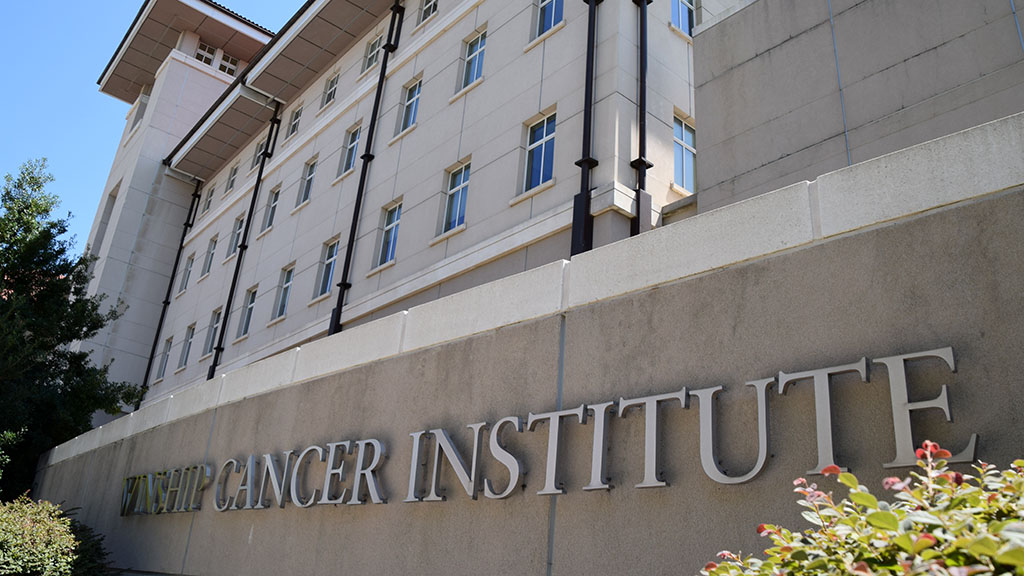Emory University is no longer employing former Emory School of Medicine Assistant Professor Abeer AbouYabis after she was placed on administrative leave last month for sharing a social media post that the University found to be “antisemitic.” It is not yet clear if Emory terminated AbouYabis’ employment or if she resigned.
“Dr. Abeer AbouYabis is no longer employed or practicing at Emory, including the Winship Cancer Institute,” Assistant Vice President of University Communications Laura Diamond wrote in an email to the Wheel. “We are working with all affected patients to facilitate their uninterrupted access to high-quality care at Emory Healthcare.”
Diamond did not respond to questions about the nature of AbouYabis’ departure or the status of the investigation, writing that the University did not have further comment on the situation.
AbouYabis was not immediately available for comment as of press time.
Dr. Abeer N. AbouYabis is an physician at Emory Winship Cancer Institute.
A sampling of her atrocious endorsement of the Hamas terrorists that murdered 1300 Israelis: “They got walls we got gliders glory to all resistance fighters”
Would you want YOUR Jewish family member to… pic.twitter.com/eu6ixuWcAV
— StopAntisemitism (@StopAntisemites) October 17, 2023
In the October message, AbouYabis wrote that she joined students from Atlanta colleges at the Israeli embassy and thanked Emory Students for Justice in Palestine for helping her “hang onto the last thread of [her] faith in humanity and hope for justice.”
“They got walls / we got gliders Glory to all resistance fighters,” AbouYabis wrote in the post. “Palestine is our demand No peace on stolen land / Not another nickel not another dollar / We will pay For israel slaughter / Not another nickel not another dime / We will pay for israel crimes.”
In a message to Woodruff Health Sciences Center faculty last month, interim School of Medicine Dean and interim Emory Healthcare Chief Academic Officer Carlos del Rio, Executive Vice President for Health Affairs Ravi Thadhani and Emory Healthcare CEO Joon Lee condemned AbouYabis’ comments, which they claimed were “rooted in bias and hate.”
“We expect all members of the Emory community to treat each other with dignity and respect at all times, recognizing that each of us comes from different backgrounds and holds different beliefs,” the administrators wrote. “There is no place in our community for language and behavior based in hatred, that incites violence and is counter to the values that unite us as health care professionals and educators.”
The University also removed AbouYabis, who specializes in hematologic disorders and malignancies at Winship Cancer Center, from Winship’s website last month. She has worked with the institution since 2018.
“As we navigate difficult conversations, our expectation is that all members of the Emory community continue to demonstrate empathy and treat each other with dignity and respect,” the University wrote in a public statement on Oct. 17. “There is no place in our community for language and behavior based in hatred, that incites violence, and that is counter to the values that unite us as educators and health practitioners.”
The account AbouYabis used to post on X, the platform previously known as Twitter, and her original post are no longer available. However, the non-profit StopAntisemitism screenshotted and shared her post on Oct. 16, calling her post an “atrocious endorsement of the Hamas terrorists.” StopAntisemitism’s post has since garnered 2.3 million views with 8,500 likes and 3,600 reposts.
AbouYabis’ termination comes amid campus and nation-wide debate and polarization about the Israel-Hamas war, with several other professors at institutions across the country facing similar responses for speaking out on both sides of the conflict.
A few days before Emory placed AbouYabis on leave, Washington University in St. Louis (Mo.) Professor Seth Crosby sparked controversy after posting a message in favor of Israel’s attacks on Palestine. Crosby later apologized before his account was deleted.
“It is a much needed cleansing, yes, but not an ethnic one,” Crosby wrote in the original post. “Israel is not targeting humans.”
Crosby later posted that he believed “in addition to being fired from Washington University [he] will be kicked off of Twitter,” but the university still employs Crosby at this time, according to Washington Vice Chancellor for Marketing and Communications Julie Hail Flory.
“The opinions he has expressed as an individual do not represent the university’s position,” Flory wrote in an email to the Wheel. “We are following up as appropriate, according to our policies and processes.”
Last month, Yale University (Conn.) Associate Professor of American Studies, Ethnicity, Race, & Migration, and Religious Studies Zareena Grewal found herself amid controversy after publicly supporting Palestine on social media. Yale student Netanel Crispe created a petition calling for the institution to fire Grewal, which has garnered over 56,000 signatures.
“My heart is in my throat,” Grewal wrote in the post. “Prayers for Palestinians. Israeli is a murderous, genocidal settler state and Palestinians have every right to resist through armed struggle, solidarity. #freepalestine.”
However, Yale backed Grewal’s right to share her own personal views, releasing a statement claiming that “Yale is committed to freedom of expression.”
There are no updates on the status of AbouYabis’ investigation at this time, according to Diamond.
“We all play a critical role in fostering an environment of respect and inclusivity,” del Rio, Thadhani and Lee wrote in their statement. “Let us show empathy, caring and support of each other. Let’s take care of ourselves and each other and, as always, reach out for support as needed.”
Correction (11/20/23 at 12:18 p.m.): An earlier version of this article stated that Washington University in St. Louis (Mo.) fired Seth Crosby. In fact, the university still employs Crosby.
Madi Olivier is from Highland Village, Texas, and is majoring in psychology and minoring in rhetoric, writing and information design. Outside of the Wheel, she is involved in psychology research and works for the Trevor Project. In her free time, you can find her trying not to fall while bouldering and watching Criminal Minds with her cat.





